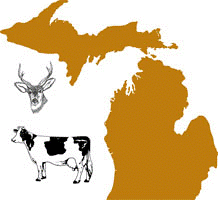Wildlife Disease and Zoonotics

Michigan Bovine Tuberculosis Bibliography and Database
Date of this Version
2002
Abstract
Tuberculosis due to Mycobacterium bovis infection is endemic in white-tailed deer (Odocoileus virginianus) in the northeastern portion of the lower Michigan peninsula (USA). Various wild carnivores and omnivores, including raccoons (Procyon lotor), are infected with M. bovis within the endemic area. To investigate the pathogenesis of tuberculosis in raccoons and the likelihood of M. bovis transmission from infected raccoons to other susceptible hosts, we experimentally inoculated raccoons with single oral doses of M. bovis (ranging from 30 to 1.7 x 105 colony forming units [CFU]), five daily oral doses of M. bovis (ranging from 10 to 1 x 105 CFU), or a single intravenous (IV) dose of 1 x 105 CFU of M. bovis, from November 1998 through December 2000. Granulomatous lesions consistent with tuberculosis, or tissue colonization with M. bovis, were seen in one of five raccoons in the single low oral dose group, one of five raccoons in the multiple low oral dose group, two of five raccoons in the multiple medium oral dose group, five of five raccoons in the multiple high oral dose group, and five of five raccoons in the IV inoculated group. In orally inoculated raccoons, lesions were most common in the tracheobronchial and mesenteric lymph nodes and lung. Excretion of M. bovis in saliva or nasal secretions was noted in all IV inoculated raccoons and two of five multiple low oral dose raccoons. Mycobacterium bovis was not isolated from urine or feces from any experimentally inoculated raccoons. The need for multiple large oral doses to establish infection, and the low number of orally inoculated raccoons that excreted M. bovis in nasal secretions or saliva, suggest that widespread tuberculosis among raccoons is unlikely.


Comments
Published in Journal of Wildlife Diseases, 38(2), 2002, pp. 266–274.